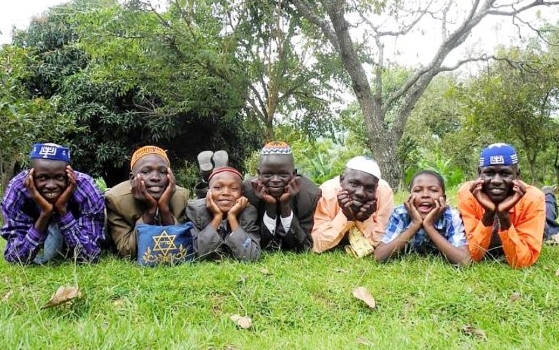News
Ugandan Jews to Israel, part-funded by government that rejects them
Uganda’s Jewish Abayudaya community reached a significant milestone on Tuesday morning, when its first-ever Taglit-Birthright group touched down at Ben Gurion Airport.

YAAKOV SCHWARTZ
The unprecedented trip for the group, made up of about 40 young people aged 18 to 27, has been in the works for almost a year, the group’s spiritual leader, Rabbi Gershom Sizomu, told The Times of Israel shortly before it began.
Arrangements for the trip were made without publicity, with Taglit-Birthright itself refusing to disclose any information about it. This is apparently because the question of the Abayudayas’ status as Jews, and consequent potential eligibility to emigrate to Israel, is the subject of a dispute involving Israel’s Interior Ministry, the Jewish Agency and Conservative Jewish leaders.
“Most of these young people have never been to Israel. This is going to be their first time, and they are very excited,” Sizomu said in a phone interview from Uganda.
“They will experience being in the Jewish state, and are excited to visit the historical sites. This trip is going to deepen their connection to Israel, and the people of Israel,” he said.
Taglit-Birthright is a non-profit organisation that offers free 10-day heritage trips to Israel for participants with at least one Jewish parent, or who have converted to Judaism. The vast majority of participants come from North America. The organisation is funded by private philanthropists and Jewish organisations, and also receives about a quarter of its funds from Israel.
Taglit-Birthright refused several requests for comment by The Times of Israel ahead of the Abayudaya group’s arrival. The organisation also instructed trip leader Michal Chacham not to speak to the media ahead of the visit.
Next year, the Abayudaya, a small community of about 2 000 located near the town of Mbale in eastern Uganda, will celebrate the 100th anniversary of its founding, when a former leader embraced Judaism after reading a Bible.
Most of the Abayudaya were officially converted between 2002 and 2008 under the auspices of US Conservative rabbis. They are not recognised as Jewish by Israel’s chief rabbinate, but according to the Law of Return, should be automatically eligible for citizenship.
The trip comes amid a battle for recognition by the Abayudaya community. In June, Israel’s Interior Ministry refused to recognise as Jewish for the purposes of immigration a member of the Abayudaya community, Yosef Kibita, who was staying at a Conservative-affiliated kibbutz in southern Israel. The ministry said that its decision reflected not only upon Kibita, but on the rest of the Abayudaya.
Rabbi Andrew Sacks, the Director of the Conservative movement’s Rabbinical Assembly in Israel, who also oversaw Abayudaya conversions and circumcisions in 2002, told The Times of Israel that this decision was the result of what he called a biased system.
“There’s clearly a pattern of discrimination here,” Sacks said. “Some might say that there’s a racial component, but that’s difficult to prove.
“Despite the Supreme Court ruling that local communities can handle their own conversions, the Interior Ministry is constantly searching for barriers and technicalities leading to the rejection of conversions by legitimate batei din [rabbinical courts] from our movement – particularly in developing countries where their skin is not white,” he said.
Rabbi Sizomu said Kibita was still petitioning to be recognised as Jewish by the state. In the meantime, the High Court has issued a temporary injunction against deporting Kibita.
Further illustrating how complex the issue has become, the Jewish Agency for Israel – a parastatal entity that was instrumental in Israel’s founding and development, and is the largest Jewish non-profit organisation in the world – has recently unconditionally recognised the Abayudaya as Jewish. Since 1948, the Jewish Agency has helped three million new arrivals emigrate to Israel, providing housing and other key resources in absorption centres throughout the country.
Over the past century, the Abayudaya have tenaciously clung to their Judaism despite living in relative isolation. They observe Shabbat, and practice ritual circumcision. Their worship combines traditional Hebrew liturgy with African melodies, and they profess to have a deep connection to Israel and fellow Jewish people.
In its relatively short lifespan, the community has encountered its share of adversity, withstanding persecution under Ugandan leader Idi Amin in the 1970s, as well as an aggressive conversion campaign by Christian missionaries.
Despite the challenges posed by Israel’s Interior Ministry, the small community remains hopeful that it will soon be welcome in the Jewish homeland.
“I am optimistic because the Jewish Agency has approved us, and this will stand unless the Interior Ministry can point out why we’re not considered Jewish,” Sizomu said.
Sacks said that ministry officials had made spurious and unfounded claims that conversions by the Reform and Conservative denominations could be used to fast-track an influx of illegitimate immigrants from developing countries seeking to take advantage of Israel’s economic opportunities.
But Sizomu said that the virtual absence of immigration applications since 2002 is proof that the Abayudaya have no ulterior motives.
“We only want to travel because of our connection to Israel, not to have some sort of mass immigration,” said Sizomu, who in 2008 graduated from a five-year programme at the Ziegler School of Rabbinic Studies at the American Jewish University in Los Angeles, and was ordained as a rabbi under the auspices of Conservative Judaism. His rabbinic training included a period spent studying in Israel, where his children also went to school.
“We would appreciate it if the Israeli government recognised us, and allowed us the same privileges afforded to the other Jews,” Sizomu said. “We are not coming out of the blue,” he said. “We’ve been practicing and living as Jews for the past 100 years.”